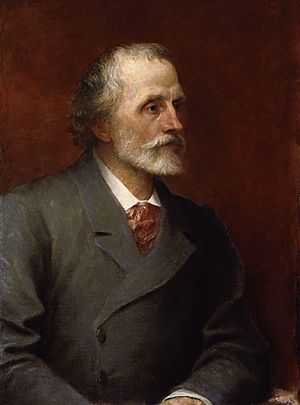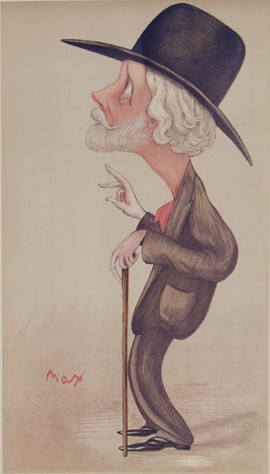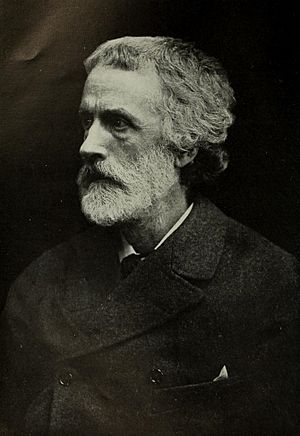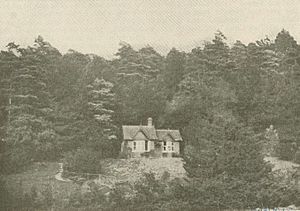George Meredith facts for kids
Quick facts for kids
George Meredith
|
|
|---|---|

George Meredith in 1893 by George Frederic Watts
|
|
| Born | 12 February 1828 Portsmouth, Hampshire, England |
| Died | 18 May 1909 (aged 81) Box Hill, Surrey, England |
| Literary movement | Victorian literature |
| Notable works | Modern Love |
| Spouses | Mary Ellen Peacock (1849–1861) Marie Vulliamy (1864–1886) |
| Children | 3 |
| Signature | |
George Meredith (born February 12, 1828 – died May 18, 1909) was an English novelist and poet. He lived during the Victorian era, a time when Queen Victoria ruled Britain.
Meredith first focused on writing poetry. Later, he became well-known as a novelist. His book The Ordeal of Richard Feverel (1859) caused a stir in Victorian society. One of his most famous novels is The Egoist (1879). During his lifetime, Diana of the Crossways (1885) was his biggest success.
His novels were special because they explored what characters were thinking and feeling. They also looked closely at how society was changing. His writing style was known for being complex. The famous writer Oscar Wilde once said it was like "chaos illumined by brilliant flashes of lightning." Meredith also encouraged and influenced other writers, like Robert Louis Stevenson and George Gissing. He was nominated for the Nobel Prize in Literature seven times.
Contents
About George Meredith's Life
Early Years and School
George Meredith was born in Portsmouth, England. He was the only child of Augustus Urmston Meredith and Jane Eliza. His family name, Meredith, is Welsh. He was proud of his Welsh roots.
His father and grandfather worked as naval outfitters. This meant they supplied ships. George's mother died when he was five years old. His father's business then failed.
George went to school in Southsea until 1840. Thanks to money left by his mother's sister, he could attend a boarding school in Lowestoft. In 1842, he went to a special school in Neuwied, Germany. This experience taught him to dislike dishonesty and to admire courage.
By 1845, he planned to become a lawyer. But he soon left law to become a journalist and poet. He moved to Pimlico in London.
First Marriage and Books
Meredith became part of literary groups. He worked with Edward Gryffydh Peacock on a magazine. Edward's sister, Mary Ellen Nicolls, also wrote for it. Mary was a widow with a young daughter.
In August 1849, Meredith married Mary. He was 21, and she was 28. His father was not at the wedding because he had moved to South Africa.
Meredith published his first book of poems, Poems, in 1851. It was dedicated to his father-in-law, Thomas Love Peacock. The famous poet Tennyson admired his work.
Life was not easy for the couple. In 1853, their son, Arthur Gryffydh, was born. They lived near Mary's father.
Meredith felt he needed to write more. This led to his first major story, The Shaving of Shagpat (1856). It was a fantasy story. The next year, he published Farina, a funny and wild tale.
Changes in His First Marriage
In 1856, George Meredith posed for a famous painting called The Death of Chatterton by Henry Wallis. Mary, Meredith's wife, and Wallis became very close.
Mary had a son, Harold, in 1858. The relationship with Wallis did not last. Mary returned to England with Harold and moved often. She died three years later from kidney problems. Meredith was living in Chelsea and often cared for their son, Arthur. He did not go to Mary's funeral.
The challenges of his marriage greatly influenced Meredith's writing. His first important novel, The Ordeal of Richard Feverel, came from this experience. The poems in Modern Love (1862) also explore the breakdown of a marriage. These poems were known for showing real feelings and thoughts.
In 1861, he published Evan Harrington. This novel explored social class and manners. It upset his father, who felt it was about him.
Second Marriage
In 1863, Meredith met Marie Vulliamy. She was 24, and he was 36. They quickly fell in love. Marie's father was a successful wool merchant. He was unsure about Meredith as a husband for his daughter.
Meredith had to provide good references. Marie's father checked into Meredith's past marriage. In the end, he agreed to the marriage because Marie loved Meredith. They married in September 1864. They settled in Surrey, first in Norbiton and then near Box Hill.
Growing as a Writer
Meredith continued to write poetry, often inspired by nature. But his most important works after his second marriage were novels. Emilia in England (1864) made fun of people trying to climb the social ladder. Rhoda Fleming (1865) was about a country girl.
He gained more recognition with The Adventures of Harry Richmond (1871) and Beauchamp's Career (1876), which touched on politics. He also wrote three shorter novels.
Meredith also tried to finish a play called The Sentimentalists. He never completed it. After he died, another writer, J. M. Barrie, used Meredith's drafts to create a one-act comedy.
Meredith's deep understanding of comedy was shown in his Essay on Comedy (1877). This essay is still important for understanding comedy. It helped him write The Egoist (1879). This novel used his ideas about comedy as a way to improve society.
Meredith did not become popular easily. But The Egoist brought him wide praise. This book, like many of his others, showed how women were often treated unfairly in Victorian times. Critics compared him to great writers like Balzac and Cervantes.
His most successful novel financially was Diana of the Crossways (1885). It was popular because it was based on real-life events. This book was also his first to become popular in America.
Influence on Other Writers
Meredith also worked as a reader for a publishing company, Chapman & Hall. He read many manuscripts each week and gave advice. This made him very influential in the literary world. However, his judgment was not always perfect. For example, he rejected Ellen Wood's novel East Lynne, which later became a huge bestseller for another publisher.
He was friends with many writers, including Robert Louis Stevenson, George Gissing, and J. M. Barrie.
In 1868, Meredith met Thomas Hardy. Hardy had written his first novel. Meredith advised Hardy not to publish it because it might be attacked by critics. Meredith knew this from his own experience. His novel, The Ordeal of Richard Feverel, was considered so shocking that a library canceled a large order. Hardy took Meredith's advice seriously.
Meredith's books were translated into Japanese and influenced the author Natsume Sōseki.
His Political Views
George Meredith was a Liberal in politics. This meant he believed in freedom and progress. He was friends with other Liberals who wanted more democracy and peace. He disliked war and strong nationalism.
Later Life and Honors
In the 1880s, Meredith became more interested in writing poetry again. He believed his poems would last longer than his novels. He published Poems and Lyrics of the Joy of Earth in 1883. This book included famous poems like "The Lark Ascending."
His novels were republished at lower prices, making them available to more people. He continued to publish new novels, exploring troubled marriages and women's independence. The Amazing Marriage (1895) was his last novel published during his lifetime.
Marie, his second wife, died in 1885 from throat cancer. Meredith praised her as a brave and loyal partner. In his later years, he had health problems that made it hard for him to move around.
Before he died, Meredith received many honors. In 1892, he became president of the Society of Authors, taking over from Tennyson. He also received an honorary degree from the University of St Andrews. In 1895, Thomas Hardy and George Gissing praised his work at a special dinner. A famous drawing of him in Vanity Fair in 1896 called him "Our First Novelist."
In 1905, he was given the Order of Merit, a special award from King Edward VII. He died at his home in Box Hill in 1909. His ashes were buried next to Marie's in Dorking, Surrey.
His Family
- George's father, Augustus, died in 1876. His second wife, Matilda, died in 1885. They had returned to England from South Africa. George visited his father sometimes out of duty.
- George Meredith had three children from his two marriages. He outlived both his wives and one child.
- His relationship with Arthur, his son by Mary, was loving at first. They traveled together to the Alps and Venice in 1861. Arthur later went to school in Switzerland and Germany. As an adult, father and son were often not close. Arthur had health problems and died of tuberculosis in 1890.
- With his second wife, Marie, he had two children. Their son, William Maxse (1865–1937), later edited Meredith's letters. Their daughter, Marie Eveleen (1871–1933), known as Mariette, married a banker and politician.
- His stepdaughter, Edith Nicolls, became a pioneer in "domestic science." She ran a cooking school and published cookbooks.
George Meredith's Writing Style
Meredith's writing style has been talked about a lot. Some people loved it, and others found it difficult.
Early critics noticed he was influenced by writers like Thomas Carlyle and Robert Browning. His novels are not full of action. Instead, they focus on what he called "action of the mind." They have a lot of dialogue, which some found "talky."
His prose, or written language, was full of clever sayings and hints. Many found it hard to understand. Some critics felt his style was too complicated for its own sake. Oscar Wilde's description of "chaos illumined by brilliant flashes of lightning" shows this. Readers often said they had to think very hard to understand his meaning.
However, many admirers, like George Eliot, praised the poetic quality of his writing. Max Beerbohm said he "packs tight all his pages with wit, philosophy, poetry, and psychological analysis." Even so, Beerbohm admitted his writing could be unclear because he had so many ideas.
As a poet, Meredith was praised for being innovative with his rhythm and stanzas. His poems were also known for their unusual sentences and metaphors.
Works by George Meredith

Meredith as caricatured by Max Beerbohm in Vanity Fair, September 1896
Novels
- The Shaving of Shagpat (1856)
- Farina (1857)
- The Ordeal of Richard Feverel (1859)
- Evan Harrington (1861)
- Emilia in England (1864), republished as Sandra Belloni in 1887
- Rhoda Fleming (1865)
- Vittoria (1867)
- The Adventures of Harry Richmond (1871)
- Beauchamp's Career (1875)
- The House on the Beach (1877)
- The Case of General Ople and Lady Camper (1877)
- The Tale of Chloe (1879)
- The Egoist (1879)
- The Tragic Comedians (1880)
- Diana of the Crossways (1885)
- One of our Conquerors (1891)
- Lord Ormont and his Aminta (1894)
- The Amazing Marriage (1895)
- Celt and Saxon (1910)
Poetry
- Poems (1851)
- Modern Love (1862)
- The Lark Ascending (1881), (which inspired Vaughan Williams' instrumental work of that title).
- Poems and Lyrics of the Joy of Earth (1883)
- The Woods of Westermain (1883)
- A Faith on Trial (1885)
- Ballads and Poems of Tragic Life (1887)
- A Reading of Earth (1888)
- The Empty Purse (1892)
- Odes in Contribution to the Song of French History (1898)
- A Reading of Life (1901)
- Selected Poems of George Meredith (1903, author's supervision)
- Last Poems (1909)
- Lucifer in Starlight
- Dirge in woods
Essays
- Essay on Comedy (1877)
See also
 In Spanish: George Meredith para niños
In Spanish: George Meredith para niños



